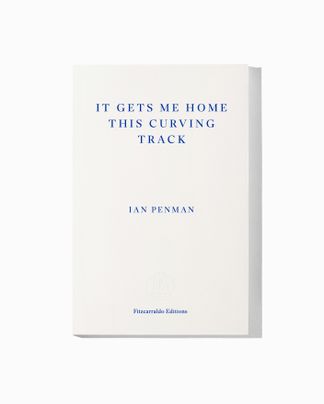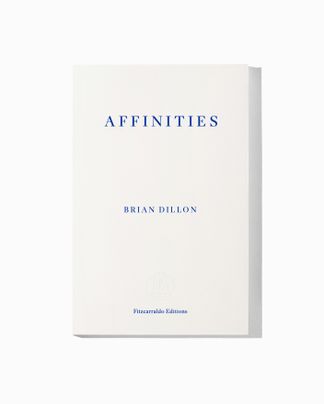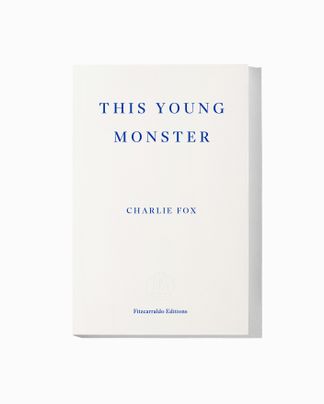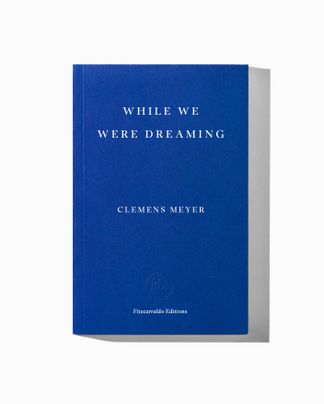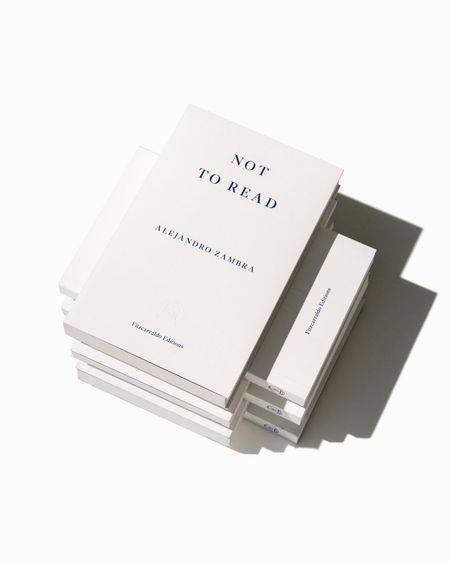Melodrama, biography, cold war thriller, drug memoir, essay in fragments, mystery – Fassbinder Thousands of Mirrors is cult critic Ian Penman’s long awaited first original book, a kaleidoscopic study of the late West German filmmaker Rainer Werner Fassbinder (1945–1982). Written quickly under a self-imposed deadline in the spirit of Fassbinder himself, who would often get films made in a matter of weeks or months, Fassbinder Thousands of Mirrors presents the filmmaker as a pivotal figure in the late 1970s moment between late modernism and the advent of postmodernism and the digital revolution. Compelling, beautifully written and genuinely moving, echoing the fragmentary and reflective works of writers like Barthes and Cioran, this is a story that has everything: sex, drugs, art, the city, cinema and revolution.
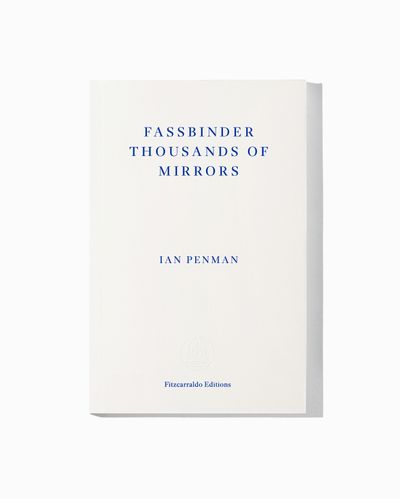
Fassbinder Thousands of Mirrors
Winner of the 2024 RSL Ondaatje Prize for Literature
Winner of the 2024 James Tait Black Memorial Prize for Biography
French paperback with flaps, 200 pages
Published 19 April 2023
Fassbinder Thousands of Mirrors
OVERTURE
A naked man stalks his grungy, low-lit apartment. You get the impression everything is the colour of nicotine. A claustrophobic place of thick carpets and bleary mirrors, empty rum and Coke bottles piled high in the kitchen. Rainer Werner Fassbinder is having one of his stand-offs with the world. He alternately berates and beseeches his impossibly patient partner, Armin Meier. He tears into his mother for her mildly reactionary politics. (She believes that the thing West Germany most needs in its new hour of crisis is a strong leader again.) He orders a delivery of drugs, then flushes them away when he hears a passing police siren. He never stops smoking, moving, talking, thinking. It is a portrait of a man utterly sure of himself, and yet flailing.
I can still recall the feelings of shock and disbelief and – what else? – something like exultation, seeing Germany in Autumn for the first time in 1978; or, more accurately, the opening 26 minutes of it directed by Fassbinder. It was the kind of full-on provocation you might then have expected from the fringes of punk or performance art, but not a 32-year-old, more-or-less-mainstream cultural figure, whose big (indeed, breakthrough) film that year was the beautifully crafted The Marriage of Maria Braun.
Germany in Autumn was conceived by various figures in the New German Cinema as a many-headed response to the unstable political situation in West Germany; a concerted campaign of violence by the Red Army Faction was being used as justification for swingeing new state-security measures, known as the Berufsverbot legislation. ‘The German Autumn’ was the name given to a period in Germany associated with the following events: the murder on 7 April 1977 by the RAF of Siegfried Buback, the attorney-general of West Germany; the murder on 30 July 1977 by the RAF of the banker Jürgen Ponto; the kidnapping on 5 September 1977 and later killing by the RAF of industrialist, businessman and former SS member Hanns Martin Schleyer; the hijacking on 13 October by the RAF and the Popular Front for the Liberation of Palestine of Lufthansa Flight 18; the discovery on 18 October 1977 of three RAF members (Gudrun Ensslin, Jan-Carl Raspe and Andreas Baader), dead in their cells in Stammheim Prison.
The film opens with footage of the Schleyer funeral, and then we launch straight into Fassbinder: Germany, inside and out. It may though have been unwise to kick off with Fassbinder’s contribution, which makes everything that follows seem flat, all too pious and pro forma: art, life and politics in their usual discrete boxes, undisturbed. Fassbinder puts his life on-screen, all its chaos and contradiction: his own cowardice and violence, doubts and addictions and tantrums. Sex and drugs and political argument as if your life depended on it. You can almost feel the sheen of sweat on his skin, the cigarette breath, the unshaven cheek. He looks soft and babyish, but also jagged and powerful. Is paranoid, but informed. A wild provocateur, utterly sure of his aim; but also worried about his place in the bigger picture. He is under siege, self-indulgent, self-pitying, drugged, and paranoid. But his segment tears through the figurative screen separating life and art, breathtaking in its honesty.
I saw it again recently for the first time since 1978 and found it just as shocking and disturbing, disarming and irresistible. Something you can’t defend yourself against – as if RWF were in the room, ranting at you, and your hypocrisy and laziness. I think that calling it shocking may have something to do with a pervasive sense of complete and uncensored intimacy. I can’t remember seeing anything remotely similar before or since. Except – only four years later in Dieter Schidor’s 1982 documentary Wizard of Babylon, there is equally disturbing footage of Fassbinder caught without veils or baffles, but in an entirely different manner. Fassbinder now is pasty and bloated, visibly stoned, nodding out, a victim of unrestrained appetites, like a doomed character in one of his own films. All the snap and vibrancy have gone. You can still detect his unique sensibility and bullish intellect behind the druggy mirage, but it’s not at all a happy or reassuring picture. What on earth happened between these two films, and their scenarios or dreams or nightmares?
(…)
Time Out Books of the Year 2023
‘This is the only book I have read twice this year. Truly it is thousands of mirrors in terms of the thoughts, images and references running through this reflective and wonderfully interior work. The world of European cinema, especially Fassbinder’s film seen through Ian Penman’s eyes, has transported me to a tantalizing place called post-war Europe. The book brings me back to my youth and my film school years in the east and west, and it reminds me of how powerful images have shaped our very understanding of love and life.’
— Xialuo Guo, chair of the 2024 RSL Ondaatje Prize for Literature
‘Stendahl once described the novel as “a mirror being carried up the street”, but Ian Penman’s extraordinary critical memoir is more like a whole convoy of the things. The book captures not only scenes both gross and beautiful from the 1970s life of the workaholic Fassbinder, but a glittering array of thoughts and moments from his own long fascination with Fassbinder’s place and time and historical moment – which was also the time of Penman’s youth, not as a German film director but as a London music journalist, hungry for Europe and all that it then represented to England, assembling a wider world for his imagination from clues and scraps and cherished frames of German movies.’
— Francis Spufford, 2024 RSL Ondaatje Prize for Literature judge
‘I’m so keen for more readers to discover this incredible little book. Every sentence is explosive. Every page left me reaching for my notebook to jot down things which required further thought. There are so many ideas, perspectives and tiny nuggets of deep insight contained within this book, I’d struggle to put a label on it. It’s biography. It’s philosophy. It’s critique. It’s flighty enough to read like fiction and yet it’s one of the most grounded books I’ve read in years. Yes, it’s about German cinema, but German cinema’s simply the mirror Penman’s holding up to force his readers to look long and hard at themselves.’
— Jan Carson, 2024 RSL Ondaatje Prize for Literature judge
‘[Fassbinder] Thousands of Mirrors is not a sorrowful kill-your-heroes recanting. It’s much more interesting than that – a freewheeling, hopscotching study of the Fassbinder allure and an investigation of Penman’s younger self…. It’s a book about a film-maker but also, hauntingly, about the way our tastes and passions change over time.’
— Anthony Quinn, Observer
‘Do Penman’s flurries of quickfire erudition add up to a dazzling kaleidoscope overall, or a labyrinth of aborted pathways? The answer is “both”. He’s boldly querying his subject’s genius from every vantage point – angry and young; older and (maybe) wiser.’
— Tim Robey, Telegraph
‘Ian Penman is an ideal critic, one who invites you in, takes your coat, and hands you a drink as he sidles up to his topic. He has a modest mien, a feathery way with a sentence, a century’s worth of adroit cultural connections at the ready, and a great well of genuine passion, which quickly raises the temperature.’
— Lucy Sante, author of The Other Paris
‘This is a wonderful book, and a surprisingly encouraging one too. Acute in its glancing survey of Fassbinder’s films, it also engages the early Seventies as a moment of ideological dishevelment that refuses to pass. If Penman lingers over those years in his own taut and revealing way, that is partly because they produced a kind of critical thought that, having not yet been squared up to fit the academic conveyor belt, could be rarified, speculative and experimental while also remaining closely engaged with political reality. Fassbinder is a great model for anyone puzzling over how we might remember as well as think and act in this chaotic time.’
— Patrick Wright, author of The Sea View Has Me Again
‘Ian Penman – critic, essayist, mystical hack and charmer of sentences like they’re snakes – is the writer I have hardly gone a week without reading, reciting, summoning to mind. The writer without whom, etc.’
— Brian Dillon, author of Affinities
‘Approached from all angles, Fassbinder is by turns a figure of intense corporeality, glistening with sweat, and an overblown mass of meaning.’
— Georgie Carr, Times Literary Supplement
‘The book is many things, but above all it is a reckoning with the idea that art might enter the commodity world and awaken its inhabitants…. [T]he late 1970s/early 1980s, in which Penman was a shadowy but vital presence – post-punk, new pop, new romanticism – is remembered similarly as a moment where a sudden societal switch led to an efflorescence of radical popular culture. Writing his book in 2022, Penman was remembering Penman in 1982 remembering the just-dead Fassbinder marking one historical moment of transition by making reference to another that took place decades earlier. To read Penman doing this in what feels like another moment of passage into something unknown and frightening is rather eerie.’
— Owen Hatherley, London Review of Books
‘This is a jittery, clammy book, sweat beading on every page.… In its exuberant phrase making, obsessive listing, emotional explosions and crashes, bursting seams – the book has three appendices – and its linguistic pyrotechnics, it ultimately comes down on the side of willing delirium.’
— John Douglas Miller, Frieze
‘[A] slender love letter.’
— Stuart Jeffries, Spectator
‘[T]his is the efficient, gregarious guidebook that neophytes have been missing’
—Chris Molner, Los Angeles Review of Books
‘Drifting through personal back alleys and intellectual boulevards à la the wanderings of Walter Benjamin and Geoff Dyer. A maze of epigrams, aphorisms (“Aren’t all masks death masks?”), anecdotes, and numbered fragments. An exquisitely companionable guidebook-inventory of a vast, intimate mental space Penman dubs the Fassbundesrepublik … A Thousand Mirrors doesn’t try to solve the contradictions of its subject but lays them out like a suit and inhabits them.’
— Howard Hampton, Artforum
‘Ian Penman’s Fassbinder Thousands Of Mirrors isn’t a biography of the epic and controversial master filmmaker Rainer Werner Fassbinder – it’s much more. It’s chock-a-block with quotes and confessions, famous writers, artists, politics, history, social commentary and a bit of sex, drugs and rock’n’roll, among – of course – film talk. Like me, you’ll have to re-read this, not least because it’s a who’s who of post-WWII culture world.’
— Rhonda Lee Reali, Buzz Magazine
‘This is a wonderful thing – an elegantly assembled scrapbook brimming with insight and history, its creator daring to once again occupy multiple roles: critic, diarist, evangelist.’
— Gary Kaill, Lunate
‘Fassbinder Thousands of Mirrors, by the British critic Ian Penman, offers … an erotics – of cinema, of memory, of the gradual wreck of history. The sensuality of Penman’s book is inseparable from the music of his prose.’
— Jeremy Lybarger, The Baffler
‘Ian Penman – legendary writer, critic and master of lucid, joyous prose – instead offers up a patchwork portrait of RWF, one assembled of 450 observations, reflections, bits of research and more. Through those fragments you get a proper sense of how one can really wallow in both Fassbinder’s massive body of work and his personal mythology – but Mirrors also reeks of adoration and joy, a delightful, emotive and appropriately flashy ode.’
— Ed Cunningham,Time Out Books of the Year 2023
Ian Penman is a British writer, music journalist and critic. He began his career at the NME in 1977, later contributing to various publications including The Face, Arena, Tatler, Sight & Sound, The Wire, the Guardian, the London Review of Books, Harper’s and City Journal. He is the author of the collections Vital Signs: Music, Movies, and Other Manias (Serpent’s Tail, 1998) and It Gets Me Home, This Curving Track (Fitzcarraldo Editions, 2019). His first original book, Fassbinder Thousands of Mirrors (Fitzcarraldo Editions, 2023), won the RSL Ondaatje Prize for Literature and the James Tait Black Memorial Prize for Biography in 2024.

